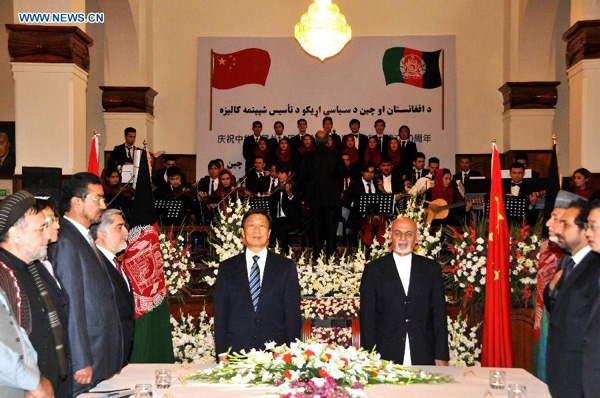Major Power Relations
Your Present Location: PROGRAMS> Major Power RelationsChen Xiaochen: China and US have reasons to cooperate in Afghanistan
By Chen Xiaochen Source: China Daily Published: 2016-1-14

Chinese Vice President Li Yuanchao and Afghan President Mohammad Ashraf Ghani attend a reception marking the 60th anniversary of China-Afghanistan diplomatic ties in Kabul, Afghanistan, on Nov. 3, 2015. [Photo/Xinhua]
The first round of the four-party talks on Afghanistan held in Islamabad on Monday saw Afghanistan, Pakistan, China and the United States discussing a peace road map for the Afghan government and the Taliban.
But why are China and the US cooperating to resolve Afghanistan`s problem?
The reasons are multiple including the US global rebalancing, the need for stabilizing Afghanistan and the region for mutual interest, the Afghan government`s inability to restore peace in the country and region, and China`s growing role in resolving international and regional issues.
First, the US global rebalancing has led to the withdrawal of US combat troops from Afghanistan, which must be offset by the efforts to keep peace of other powers. US President Barack Obama`s decision to slow down the troop withdrawal through 2015 reflects the importance he attaches to the outcome of the US` engagement in Afghanistan.
Second, China and the US both have an interest in a peaceful and self-sustaining Afghanistan. On the diplomatic front, China, the US, and Afghanistan are already engaged in trilateral cooperation. And peace between the Taliban and the Afghan government can be established only after restoring trust between the Afghanistan and Pakistan, some of whose territory has been used by Taliban insurgents as a haven.
Moreover, US pressure on Pakistan has had limited effects and China could help reshape the dialogue. As an "all weather friend" of Pakistan, China is well positioned to play the role of constructive mediator, especially because Washington-Islamabad relations have deteriorated over the years.
Third, Afghanistan needs a government that can build infrastructure, create jobs, provide education and healthcare, and deliver justice to its people in order to establish permanent peace. But the fiscal and functional failure has made it difficult for the Afghan government to do so.
China and the US both have invested in development projects in Afghanistan, yet they have adopted different approaches for their aims. Of the $1.59-billion assistance the US extended to Afghanistan in the fiscal year 2015, about 19 percent was dedicated to economic development. Four-fifths of the amount covered peace, security, democracy, governance, healthcare and education issues, and social services, which underpin sustainable, long-term growth. And China`s contribution is targeted investments in infrastructure and extraction of natural resources in Afghanistan.
Fourth, Afghanistan`s stability is essential to the success of China`s Silk Road Economic Belt initiative. And to stabilize the situation in Afghanistan and develop its economy, China could seek the cooperation of the US. On the other hand, the US needs China`s cooperation to realize its goals. So the China-US cooperation to restore peace in Afghanistan is not a zero-sum game.
From China`s perspective, the border between Afghanistan and its Xinjiang Uygur autonomous region means it will continue to have a stake in its neighbor`s stability. Since the Silk Road Economic Belt initiative envisions pipelines, telecom, and high-speed railway connecting China with Central Asia, the Middle East and Europe with Xinjiang as the hub, China has to make efforts to ensure that terrorists, separatists and extremists do not receive training in the lawless Afghanistan-Pakistan border region and threaten its future projects.
Investment is crucial for economic growth and social stability, and the China-led Asian Infrastructure Investment Bank can play a positive role in this regard in Afghanistan. Also, new channels of finance such as the Silk Road Fund can boost investment in Afghanistan.
China and the US have many reasons to cooperate in Afghanistan. Starting with infrastructure and investment, the two countries can shelve their differences and focus on Afghanistan`s development for mutual benefit. And this is precisely where the Belt and Road Initiative can play a very constructive role.
More importantly, China-US cooperation can be beneficial not only to Afghanistan and the region, but also other countries and regions. It could have spill-over effects in other fields, too, as it can bridge the trust gap between Beijing and Washington and help create a demonstrative model for bilateral relations.
The author is a researcher at Chongyang Institute for Financial Studies, Renmin University of China.
Key Words: China; Afghan; US























































































 京公网安备 11010802037854号
京公网安备 11010802037854号





